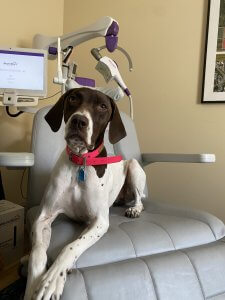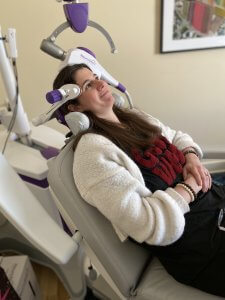TMS

Millie, therapist in training, showing you how comfortable the TMS treatment chair is :)
Transcranial Magnetic Stimulation, (TMS for short), is a safe and effective non-invasive, non-medication treatment for depression. Treatment is FDA approved for individuals age 15 and up and is typically covered by insurance. (We accept BCBS at this time.)
At our office we use the Neurostar TMS device as it is the only device approved for adolescents at this time.
We have immediate openings for TMS treatments, please book an initial appointment with Dr. Mallory if you are interested in treatment.
TMS Works
- TMS became FDA approved as a depression treatment in 2008.
- Up to 83% of patients show a significant improvement in depressive symptoms after treatment.
- Up to 62% of patients have complete remission from depression after treatment.
- Our patients who have undergone TMS therapy report an increase in energy, a decrease in symptoms of depression, a decrease in anxiety symptoms, and an increase in quality of life.

What to Expect
If you are interested in TMS, the first step is to make a 60 minute appointment with Dr. Mallory. She will go over your medical history to determine if TMS is a good option for you and if there are any contraindications and will go over past medications that you have tried so we can then submit a request for TMS authorization to your insurance company. (At this time we are only able to bill to BCBS for TMS appointments, we do have private pay TMS rates-please contact us if you would like this option.)
After the initial meeting with Dr. Mallory, we will request authorization from your insurance company and reach out to schedule your first session as soon as we receive approval. Your first TMS session is 45-60 minutes long, after that, sessions take place daily for 20-25 minutes a day. Late afternoon and early evening appointments are typically available. You will have 36 sessions in total for complete treatment. Sessions take place M-F and typically patients are able to easily schedule their sessions around school, work, and other commitments. There is no sedation for treatments and you can drive immediately after treatment.
